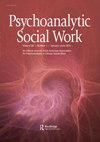我们能成为朋友吗?当成为朋友的愿望成为治疗关系动态的一部分
IF 0.3
Q4 SOCIAL WORK
引用次数: 0
摘要
摘要精神分析理论和实践已经倾向于将关系和依恋动力学作为将个人带入精神分析和心理治疗的许多问题的病因和治疗方法,强调了每种治疗关系作为工作的关键部分的重要性。但是,这种关系是什么?我们不是父母/孩子,也不是朋友,但深厚的相互联系往往会发展和加强这一过程。参与者中的一方和/或双方产生的成为朋友的幻想,可以代表这种关系的重要方面,通常是未经模拟的方面。精神分析理论并没有充分探索这种成为朋友的愿望的含义,但根据我的经验,找到反思成为朋友的希望或幻想的方法可以导致对成人依恋的更深、更复杂的理解。在这篇文章中,理论和临床例子将被用来检验当思想、幻想和希望成为朋友进入治疗空间时所产生的阻力以及矛盾、冲突、希望和恐惧。本文章由计算机程序翻译,如有差异,请以英文原文为准。
Could We Be Friends? When a Wish to Be Friends Becomes Part of a Therapeutic Relational Dynamic
Abstract Psychoanalytic theory and practice have moved toward privileging relational and attachment dynamics as both cause and cure of many of the issues that bring individuals into psychoanalysis and psychotherapy, highlighting the significance of each therapeutic relationship as a key part of the work. But, what is that relationship? We are not parent/child, nor are we friends, but a deep, mutual bond often develops and enhances the process. Fantasies of being friends, emanating from either and/or both participants, can represent important, often unformulated, aspects of this relationship. Psychoanalytic theory has not fully explored meanings of this wish to be friends, but it is my experience that finding ways to reflect on a wish or fantasy to be friends can lead to deeper and more complex understanding of adult attachment. In this article, theory and clinical examples will be utilized to examine resistances as well as contradictions, conflicts, and hopes and fears that come into play when thoughts, fantasies, and wishes to be friends to enter the therapeutic space.
求助全文
通过发布文献求助,成功后即可免费获取论文全文。
去求助
来源期刊

Psychoanalytic Social Work
SOCIAL WORK-
CiteScore
0.40
自引率
0.00%
发文量
27
期刊介绍:
Psychoanalytic Social Work provides social work clinicians and clinical educators with highly informative and stimulating articles relevant to the practice of psychoanalytic social work with the individual client. Although a variety of social work publications now exist, none focus exclusively on the important clinical themes and dilemmas that occur in a psychoanalytic social work practice. Existing clinical publications in social work have tended to dilute or diminish the significance or the scope of psychoanalytic practice in various ways. Some social work journals focus partially on clinical practice and characteristically provide an equal, if not greater, emphasis upon social welfare policy and macropractice concerns.
 求助内容:
求助内容: 应助结果提醒方式:
应助结果提醒方式:


